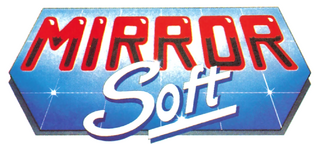Difference between revisions of "Mirrorsoft"
From Sega Retro
| (11 intermediate revisions by 4 users not shown) | |||
| Line 1: | Line 1: | ||
| − | {{ | + | {{CompanyBob |
| − | | logo= | + | | logo=Mirrorsoft logo.png |
| − | + | | founded=1983 | |
| − | | founded= | ||
| defunct=1991-12 | | defunct=1991-12 | ||
| − | |||
| − | |||
| mergedinto=[[Acclaim Entertainment]] (1992) | | mergedinto=[[Acclaim Entertainment]] (1992) | ||
| − | | headquarters=United Kingdom | + | | headquarters=Irwin House, 118 Southwark St., London, SE1 OSW, United Kingdom{{fileref|SummerCES1991 Directory.pdf|page=269}} |
}} | }} | ||
{{sub-stub}}'''Mirrorsoft''' was a video game software publisher headquartered in the United Kingdom, owned by Mirror Group Newspapers. | {{sub-stub}}'''Mirrorsoft''' was a video game software publisher headquartered in the United Kingdom, owned by Mirror Group Newspapers. | ||
| − | It was founded as a publisher of educational software before moving into games. Mirrorsoft's most | + | It was founded as a publisher of educational software before moving into games. Mirrorsoft's most notable game was ''[[Tetris]]''; they were responsible for passing on the arcade rights and illegitimate console rights they acquired from Andromeda Software to [[Atari Games]]/[[Tengen]], who would pass the Japanese arcade rights and illegitimate Mega Drive rights to [[Sega]]. All of Mirrorsoft's Sega games were published either through their publishing labels [[Arena]] and [[Image Works]]. |
| − | Due to financial troubles at Mirror Group in the latter half of 1991, Mirrorsoft ceased trading in December, | + | Due to financial troubles at Mirror Group in the latter half of 1991, Mirrorsoft ceased trading in December, and its assets were bought by [[Acclaim Entertainment]] in early 1992{{magref|vgce|40|22}}{{magref|gamepro|34|98}}. The Image Works brand survived for a short period of time (a small handful of its titles being re-published by [[Virgin Games]] in the latter half of 1992), while Arena was maintained until 1994 after which everything was merged under a single Acclaim brand. |
==Softography== | ==Softography== | ||
| − | + | {{CompanyHistoryAll|Mirrorsoft}} | |
| − | |||
| − | |||
| − | == | + | ==References== |
| − | + | <references /> | |
| − | [[Category: | + | [[Category:Third-party software publishers]] |
| + | [[Category:Licensors]] | ||
Latest revision as of 14:58, 21 March 2024

| ||
| Mirrorsoft | ||
|---|---|---|
| Founded: 1983 | ||
| Defunct: 1991-12 | ||
| Merged into: Acclaim Entertainment (1992) | ||
Headquarters:
|
This teeny-tiny article needs some work. You can help us by expanding it.
Mirrorsoft was a video game software publisher headquartered in the United Kingdom, owned by Mirror Group Newspapers.
It was founded as a publisher of educational software before moving into games. Mirrorsoft's most notable game was Tetris; they were responsible for passing on the arcade rights and illegitimate console rights they acquired from Andromeda Software to Atari Games/Tengen, who would pass the Japanese arcade rights and illegitimate Mega Drive rights to Sega. All of Mirrorsoft's Sega games were published either through their publishing labels Arena and Image Works.
Due to financial troubles at Mirror Group in the latter half of 1991, Mirrorsoft ceased trading in December, and its assets were bought by Acclaim Entertainment in early 1992[2][3]. The Image Works brand survived for a short period of time (a small handful of its titles being re-published by Virgin Games in the latter half of 1992), while Arena was maintained until 1994 after which everything was merged under a single Acclaim brand.
Softography
System 16
- Tetris (1988)
Master System
- Back to the Future Part II (1991)
- Speedball (1991)
Mega Drive
- Tetris (1989)
- Battlemaster (1991)